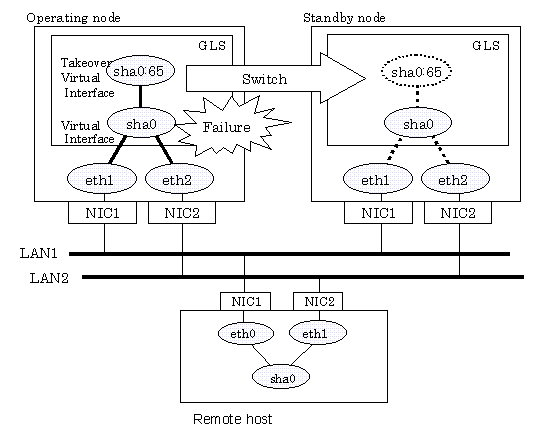

| PRIMECLUSTER Global Link Services Configuration and Administration Guide: Redundant Line Control Function 4.2 (for Linux) |
Contents
Index
 
|
| Chapter 5 GLS operation on cluster systems |
In cluster system, Redundant Line Control Function supports the following operation modes:
How cluster failover is dealt with in each mode is shown below.
|
Mode |
Active Standby System |
Active Standby System |
Mutual standby System |
Cascade System |
Priority transfer system |
Duplicate transfer path for SIS |
|
Fast switching mode |
A |
A |
A |
A |
A |
X |
|
NIC switching mode |
A |
A |
A |
A |
A |
A |
[Meaning of the symbols] A: Supported X: Not supported
Virtual IP addresses allocated to virtual interfaces are taken over if a cluster switching event occurs. GLS does not provide any function to support MAC address takeover and system node name takeover. Table 5.2 indicates the support status of each takeover function.
|
Cluster Operation mode |
IP address |
MAC address |
IP address |
IP address |
IP address |
|
1:1 Active standby |
A |
X |
X |
X |
X |
|
N:1 Active standby |
A |
X |
X |
X |
X |
|
Mutual standby |
A |
X |
X |
X |
X |
|
Cascade |
A |
X |
X |
X |
X |
|
Priority transfer |
A |
X |
X |
X |
X |
[Meaning of the symbols] A: Supported X: Not supported

Figure 5.1 shows an example of cluster switching for the virtual interface

The logical unit number for the virtual interface for cluster switching is 65 or later. (sha0:65, sha0:66)
 5.1.1 Active Standby
5.1.1 Active Standby 5.1.2 Mutual standby
5.1.2 Mutual standby 5.1.3 Cascade
5.1.3 Cascade 5.1.4 Monitoring resource status of standby node
5.1.4 Monitoring resource status of standby node 5.1.5 Tagged VLAN interface multiplexing on cluster system
5.1.5 Tagged VLAN interface multiplexing on cluster system
Contents
Index
 
|